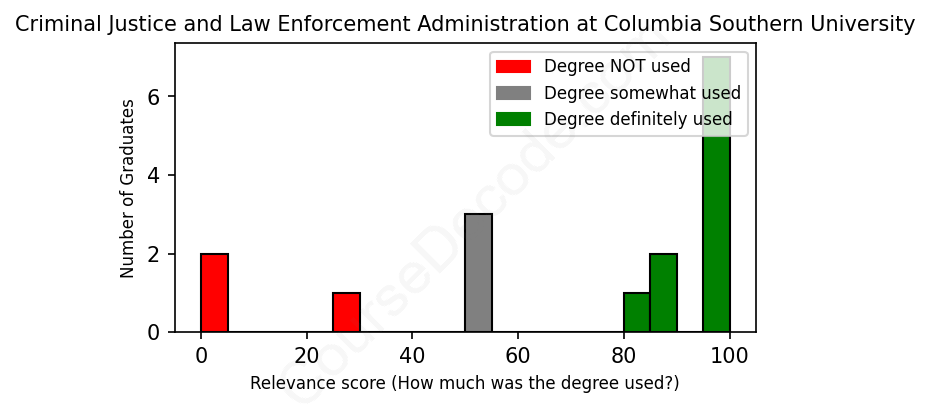
First, some facts. Of the Criminal Justice and Law Enforcement Administration graduates from Columbia Southern University we've analyzed , here's how many have used (or NOT used) their degree in their career:

These are estimates based on AI analysis of 16 LinkedIn profiles (see below).
The verdict? Slightly above average. Overall, with an average relevance score of 70%, Criminal Justice and Law Enforcement Administration graduates from Columbia Southern University have a slightly higher likelihood (+3%) of finding work in this field compared to the average graduate across all fields:
And for comparison, here's the chart for all profiles we've looked at across all degrees.
Also, after graduating, only 31% of these graduates have pursued further education other than another Bachelor's degree (such as a Masters degree or other), compared to the average across all profiles of 35%. This suggests a Bachelors degree is enough for most Criminal Justice and Law Enforcement Administration graduates, and it's normal to look for work straight after graduation.
See the details:
|
Relevance score: 25% We think this person has NOT gone into a career related to their degree. We think this person has NOT gone into a career related to their degree.
DEGREE INFOGraduated in 2011 from Columbia Southern University with a Bachelor of Applied Science (BASc) in Criminal Justice and Law Enforcement Administration. No other secondary education since. JOB HISTORY SINCE GRADUATIONOperations Sergeant US Army Jan 2012 - Jul 2012 Plans Sergeant Major  United States Army Pacific, USARPAC) Jul 2013 - May 2014 Assistant Chief of Staff, Engineering Directorate SGM  United States Army Pacific, USARPAC) May 2014 - Oct 2015 Battalion Command Sergeant Major  84th Engineer Battalion Oct 2015 - Oct 2017 Brigade Plans Sergeant Major  HHC, 130th Engineer Brigade Oct 2017 - Aug 2018 Army Instructor  U.S. Army JROTC Sep 2018 - Present ABOUTNo information provided. |
The top 10 most common jobs done by the graduates we've analyzed (ranked most common to least) are:
When looking at the job trajectories of graduates from Columbia Southern University's Criminal Justice and Law Enforcement Administration program, you can see a clear trend. Many of them have landed roles that are directly linked to law enforcement, such as Sergeants, Lieutenants, and even Detectives in various police departments. These positions often require the application of knowledge and skills learned during their studies, making them very relevant to the field. For example, being a Sergeant or Lieutenant at a Sheriff’s Office is a prime example of how their educational background directly translates into real-world law enforcement responsibilities.
However, not all career paths taken by these graduates align closely with their degree. Some have ventured into roles like Fleet Manager, Environmental Health Safety Coordinator, or even a Video Game Streamer, which show a disconnect from the core principles of Criminal Justice. These jobs may utilize some soft skills or management techniques, but they don't really tap into the deeper knowledge of criminal justice and law enforcement that the degree provides. Overall, while many graduates are indeed working in relevant positions, others have taken a different route, highlighting that career outcomes can vary widely even within a specialized field like this.
Here is a visual representation of the most common words in job titles for Criminal Justice and Law Enforcement Administration graduates (this is across all Criminal Justice and Law Enforcement Administration graduates we've analyzed, not just those who went to Columbia Southern University):

From analyzing the career trajectories of graduates from Columbia Southern University's Criminal Justice and Law Enforcement Administration program, it seems like many of them have taken solid steps into careers directly related to criminal justice and law enforcement. Right after graduating, a lot of individuals start off in roles like police officers, sergeants, or in various management positions within the military. This trend is evident with many graduates moving into law enforcement roles at local police departments or sheriff’s offices, or into military positions, which sets a strong foundation for their future careers.
Five to ten years later, many graduates have typically climbed the ranks, achieving supervisory or leadership roles. For instance, you’ve got people transitioning from sergeant to lieutenant or even detective roles within police departments. Others have taken on high-level positions such as Chief of Police or specialized investigators, demonstrating a clear progression in their careers. It looks like the majority of these individuals have successfully navigated into impactful roles within the criminal justice system, indicating that a degree from this program can lead to robust job opportunities and promising career growth in relevant fields. While the data shows some diversions into unexpected areas, such as video game streaming, the overall trend still leans towards success within the realms of law enforcement and criminal justice administration.
A Bachelor's degree in Criminal Justice and Law Enforcement Administration, whether at Columbia Southern University or elsewhere, is generally considered to be on the easier side compared to some other majors, especially if you're passionate about the subject. The coursework often blends practical knowledge with theoretical concepts, making it manageable if you’re willing to engage with the material. This program may involve a lot of reading, writing papers, and understanding laws and policies, but it’s typically straightforward if you stay organized and put in a decent amount of effort. Plus, many people find the topics fascinating, which can make the whole experience feel less like "school" and more like exploring something you care about. Overall, if you have an interest in criminal justice, you might find it to be a pretty smooth ride!
Most commonly, in the LinkedIn profiles we've looked at, it takes people 4 years to finish a Bachelor degree in Criminal Justice and Law Enforcement Administration.
So, looking at the job history of these graduates from Columbia Southern University, it seems like a lot of them are doing pretty well financially, especially those in law enforcement and military roles. Positions like Chief of Police or Operations Sergeant usually come with decent salaries, and even roles like Sergeant or Lieutenant at various sheriff’s offices can provide a solid paycheck, especially with years of experience. There are also some interesting career paths, like the Video Game Streamer, which could potentially lead to great earnings if they get popular. Overall, it looks like many of these folks are in stable jobs that can pay above average, especially in the federal government and law enforcement sectors, which is definitely a good thing!
Here is a visual representation of the most common words seen in the "about" section of LinkedIn profiles who have a Bachelor degree in Criminal Justice and Law Enforcement Administration (this is across all Criminal Justice and Law Enforcement Administration graduates we've analyzed, not just those who went to Columbia Southern University). This may or may not be useful:

Here are all colleges offering a Bachelor degree in Criminal Justice and Law Enforcement Administration (ordered by the average relevance score of their Criminal Justice and Law Enforcement Administration graduates, best to worst) where we have analyzed at least 10 of their graduates:
| College | Score | Count |
|---|---|---|
 American Military University American Military University
|
81 | 10 |
 Columbia Southern University Columbia Southern University
|
70 | 16 |
 Western Illinois University Western Illinois University
|
63 | 20 |
 Columbia College Columbia College
|
59 | 10 |
 John Jay College (CUNY) John Jay College (CUNY)
|
57 | 11 |
 University of Phoenix University of Phoenix
|
54 | 88 |
 Florida International University Florida International University
|
53 | 13 |
 Park University Park University
|
53 | 23 |
 Virginia Commonwealth University Virginia Commonwealth University
|
34 | 10 |